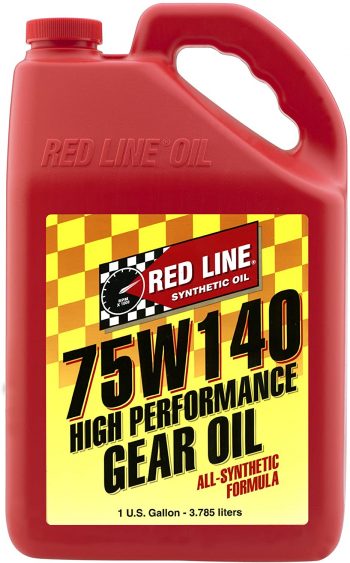If you have a big pickup truck or a piece of heavy duty machinery with a big transmissions and gear boxes, you need to have the right gear oil for the job. 75w140 gear oil is used by many different transmissions, generally high horsepower vehicles such as passenger busses and large vans, large pickup trucks, service vehicles, and other large vehicles with tons of horsepower.
75w140 gear oil is great at minimizing friction and damage for transmissions that operate at high heats. It’s all about being resistant to thinning at high temperatures. Yes, there are many options out there, which can make coming to the right choice a challenge. Right now, we are here to help you find the best 75w140 synthetic gear oil for your heavy duty machine.
Overall #1 Rated Pick

The number on pick for the 75w140 synthetic gear oil would have to be Redline Gear Oil 75w140. There are a variety of reasons why this is the overall #1 rated pick, so let’s take a closer look.
• One thing which stands out about this particular synthetic gear oil is that is works with many different types of vehicles.
• It’s ideal for smaller vehicles which require 75w140 gear oil, as well as for a wide variety of vans, pickup trucks, heavy machinery, and for semi trucks as well.
• This gear oil is designed to operate at very high temperatures and with large amounts of pressure, as is present in large motors and transmissions.
• This Redline 75w140 gear oil is ideal as it stays viscous even at very high temperatures, which is required for large vehicles.
• This particular gear oil excels at preventing all kinds of friction damage, wear, rusting, and corrosion.
• Through the use of this gear oil, you can help maximize the mileage you get out of your vehicle, as well as the amount of available HP.
75w140 Synthetic Gear Oil – Buyer’s Guide
Before you go out and start buying gear oil, there are a few things which you should be familiar with, so let’s go over a little buyer’s guide, just so you know what you are getting into.
What is Synthetic Gear Oil
You might be wondering why you would use synthetic gear oil as opposed to mineral gear oil. The reason for this is because mineral gear oils do not perform as well as synthetic oils under extreme conditions, mainly under extreme heat or cold.
Seeing as most large vehicles do operate at extreme temperatures, particularly extreme heat, high performance synthetic gear oil is required.
Gear Oil Viscosity
Something else you might be wondering has to do with synthetic gear oil viscosity. As you might notice, all gear oils come with viscosity ratings, such as 75w140, with the first number representing the lowest temperature which it can efficiently operate at, and the second number representing the highest viable operating temperature.
75w140 gear oil, while it performs fine at lower temperatures, is specifically design for higher temperatures. This is a type of gear oil often used in large vehicles which produce a lot of HP and heat. When it comes to trucks and heavy machinery, high viscosity gear oil is required.
How Often to Change Gear Oil
If you are looking to keep your vehicle in top condition for as long as can be, you do need to change the gear oil on a regular basis. Gear oil for vehicles, as recommended by manufacturers, needs to be changed at least every 80,000 miles. Although, most will recommend going no more than 60,000 miles, with the absolute maximum time between gear oil changes being 80,000 miles.
How to Change Gear Oil
Sure, you can go to a mechanic and have them change the gear oil for you, but it is also possible to do it on your own. So, how do you change gear oil on your car or truck? Below we have included a video which does quite a good job at explaining how to change gear oil.
Features to Look for in Gear Oil
Before you go out and buy any kind of gear oil, there are a number of features and factors which you should look out for.
• Always remember to look out for viscosity requirements. Every vehicle requires gear oil with a specific viscosity to function properly, with some being able to handle more than one type.
• Check to see if you have a vehicle with a special gearbox which may require extra friction additives. Some gear oils come with friction additives, whereas others do not.
• See how much protection the gear oil in question can provide. Is it designed to prevent overheating and to provide basic lubrication, or can it also help keep your vehicle clean and rust free?
• Always be sure to look out for compatibility. Using the wrong gear oil for your vehicle can have disastrous consequences.
Best 75w140 Synthetic Gear Oil
The top best product [hide]
Redline Gear Oil 75w140 – Best Gear Oil 75w140 F350

Royal Purple 75W140 Gear Oil – 75w140 Gear Oil for Differential

Lucas 75/140 Synthetic Gear Oil – Gear Oil for Semi Trucks

Valvoline 75W-140 Gear Oil – Best 75w140 Synthetic Gear Oil for Ford F250

Mobil 1 102490 75W-140 Synthetic Gear Lube – Best Gear Oil for Jeep Differential

75w140 Synthetic Gear Oil - FAQ
Which Gear Oil is Best for Ford F150
Which Types of Vehicles use 75w140 Synthetic Gear Oil
How Much is 75w140 Synthetic Gear Oil
How Much Gear Oil do Cars & Trucks Need
Conclusion
The most important thing to keep in mind here is that you first need to check the gear box on your vehicle before buying any sort of gear oil. You need to ensure that the various 75w140 gear oils we have reviewed today are in fact compatible with your vehicle.






Add comment